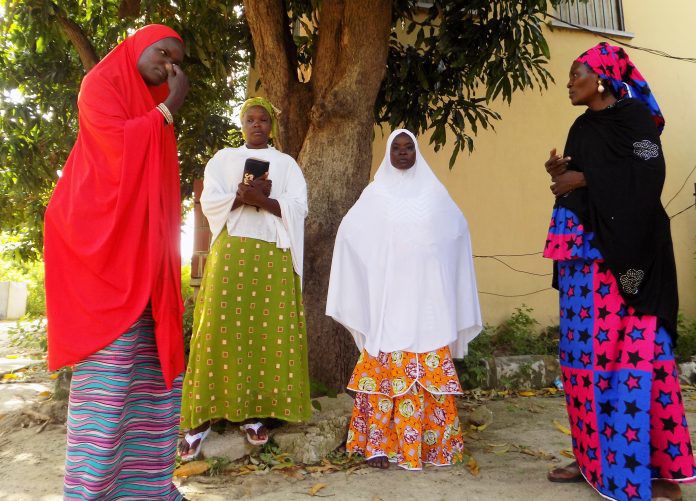Starving and alone, five-year-old Umar was left for dead in a camp for internally displaced people in northeast Nigeria.
The reason? He is the son of a Boko Haram fighter.
It took a Boko Haram widow to rescue Umar. Fatima Salisu had been held captive by the insurgents for 16 months and was forced to marry an Islamist fighter before she escaped to the camp outside the northeastern city of Maiduguri.
Like Umar, the 25-year-old native of Cameroon is an outcast. Salisu says the other women never share food or board with her and they refuse to call her anything but a “Boko Haram wife”.
“They don’t allow us to come near them. Everyone treats us with contempt,” Salisu told AFP, speaking outside the camp to avoid attracting attention. “We are not wanted.”
She can tolerate the jeers, but she worries about Umar and other children who are bullied.
Salisu said one Nigerian soldier had told her to “let him die. He is a Boko Haram child and we will throw him into the garbage.”
She said she fears the ill treatment could turn the children against society.
– New underclass –
Umar is not alone. Experts warn of a growing divide between women who were captured and children born to Boko Haram militants and the rest of the population.
This new Boko Haram underclass is struggling to reintegrate into a society reeling after years of devastating attacks by the insurgents in their bloody pursuit of an independent Islamic state.
“Ostracising the children of insurgents will impede the process of community reconciliation and rehabilitation – and that, distinct from any potentially radicalising effects – makes it a troubling development,” Hilary Matfess, a Washington-based analyst, told AFP.
The United Nations estimates that this year seven million people are in need of humanitarian assistance in northeast Nigeria.
At risk are 1.4 million children who have been displaced by the conflict and 20,000 children in the northeast who have been separated from their families, according to an August UNICEF report.
Among the most pressing needs is the reintegration of women and children who are returning to their communities after being held captive by Boko Haram.
But the conflict has made people in the northeast wary. “There has been a serious breakdown of trust in communities across the north,” Matfess said.
“A number of women, most famously the Chibok girls, were abducted into the insurgency, but a significant number of women joined the insurgency of their own accord,” said Matfess.
“Telling the difference once women return to their communities — whether through escape or liberation by the security forces — is next to impossible.”
– ‘We were forced’ –
Even family members don’t sympathise with relatives “tainted” by Boko Haram.
“Our blood relations stigmatise us,” said Hafsa Ibrahim, a 27-year-old who was kidnapped from the town of Bama and forcibly married to a Boko Haram fighter.
“They think it was with our consent that we got married to Boko Haram,” Ibrahim said, choking back tears. “We were forced.”
Some local politicians have acknowledged the problem.
“We must show love to these innocent children as much as we should support the innocent mothers,” Borno State Governor Kashim Shettima has said, warning that otherwise the Boko Haram children will “inherit” the fervour of their fathers.
Entrenched “deterministic views” in northeast Nigeria hold that biological fathers transmit “bad blood” to the children — “a child of a snake is a snake” is one saying encapsulating this idea, according to global organization International Alert in a 2016 report on the topic.
With the Nigerian army claiming a series of successful attacks on Boko Haram, winning back territory and freeing thousands of people, the need to reintegrate captives has never been greater.
But if life in the camp is any indication, much work still needs to be done.
“Whenever the child cries they tease him, and tell him to go meet his Boko Haram father in the bush,” Salisu said about her adopted boy. “They show no love.”
(AFP)













